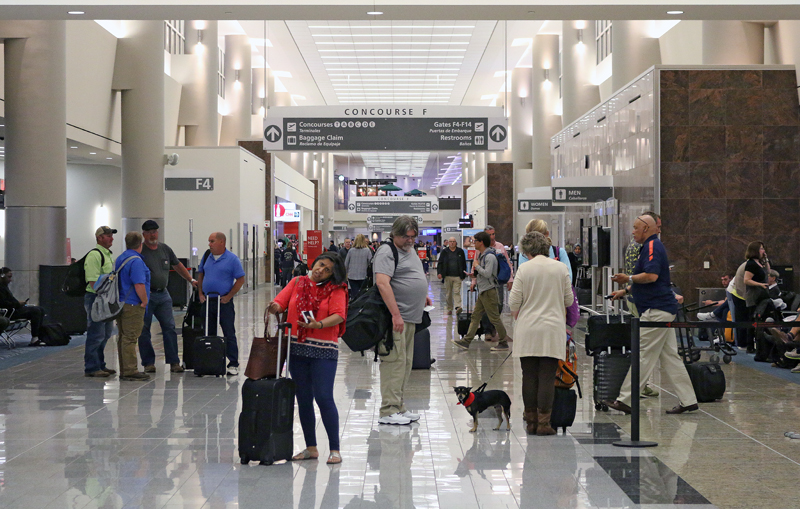An announcement from Delta Air Lines stated that passengers will be limited to one emotional support animal — as well “pit bull type dogs” to no longer be accepted as either service animals or emotional support animals — effective as of Tuesday, July 10, 2018…
Final Statement on Emotional Support Animals Aboard Airplanes Issued by Department of Transportation of the United States
…but the Enforcement Office of the Department of Transportation of the United States “views a limitation based exclusively on breed of the service animal to not be allowed under its service animal regulation” as per this Final Statement of Enforcement Priorities Regarding Service Animals, which was released on Thursday, August 8, 2019 in order to provide “greater clarity to passengers, airlines, and other stakeholders about the DOT’s interpretation and enforcement of the existing service animal rules”, according to this article which was posted at the official Internet web site of the agency.
Airlines such as Delta Air Lines cannot place restrictions on a specific breed — such as a pit bull — unless a specific animal poses a direct threat; and regardless of the breed of dog. The Enforcement Office intends to use available resources to ensure that dogs as a species are accepted for transport.
In addition to the enforcement priority pertaining to the breed of dog, other issues were addressed by the Final Statement.
Species Limitations
Priority will be placed on ensuring that the most commonly recognized service animals — such as dogs, cats and miniature horses — are accepted for transport. Airlines are still subject to enforcement action if they categorically refuse to transport other species that they are required to transport under the current rule.
Documentation Requirements
Airlines may determine in advance of the flight whether any service animal poses a direct threat; but the rule does not clearly indicate how airlines must arrive at that assessment. Action will not be taken against an airline for asking users of any type of service animal to present documentation related to the vaccination, training or behavior of the service animal as long as a determination as to whether an animal poses a direct threat to the health or safety of others is believed to be reasonable and supported by that documentation. The animal documentation requirements of airlines will be monitored by the Enforcement Office to ensure that they are not being used to unduly restrict passengers with disabilities from traveling with their service animals.
Containment
The current disability regulation of the Department of Transportation contains no explicit requirements or prohibitions with respect to containment of service animals in the cabin. Containment issues for all service animals will be considered by the Enforcement Office on a case-by-case basis, with a focus on reasonableness. In general, tethering and similar means of controlling an animal that are permitted in the Americans with Disabilities Act context would be reasonable in the context of controlling service animals in the aircraft cabin.
Advance Notice
Airlines are prohibited from requiring advance notice for passengers traveling with service animals — other than emotional support animals and psychiatric support animals. Enforcement resources will be focused on ensuring that airlines do not require advance notice for passengers with traditional service animals, as advance notice may significantly harm passengers with disabilities as it prevents them from planning travel at the last minute which may be necessary for work or family emergencies.
Check-In Requirements
Airlines are not violating the disability regulation of the Department of Transportation if they require lobby check-in for emotional support animals and psychiatric support animals because the regulation permits airlines to require users of emotional support animals and psychiatric support animals to check in one hour earlier than the check-in time for the general public.
Proof That an Animal Is a Service Animal
Airlines are permitted to seek credible verbal assurance that a passenger is an individual with a disability and the animal is a service animal. If the disability of the passenger is not clear, airlines may ask questions to determine the need of the passenger for the animal — even if the animal has other indicia of a service animal, such as a harness, vest or tag.
Number of Service Animals Per Passenger
Because the current disability regulation of the Department of Transportation is not clear as to how many service animals may travel with a passenger with a disability, enforcement efforts will generally focus on ensuring that airlines are not restricting passengers from traveling with one emotional support animal and a total of three service animals, if needed. Generally, one emotional support animal should be sufficient for emotional support; but a passenger may reasonably need more than one task-trained service animal.
Number of Service Animals Per Aircraft
Airlines are not permitted to deny transport to a service animal accompanying a passenger with a disability because of a limit on the total number of service animals which can be on any airplane for a flight. Denial of transport to an emotional support animal because of the number of other emotional support animals in the cabin of aircraft would be a violation of the current disability regulation of the Department of Transportation, as emotional support animals are considered service animals under the existing rule.
Weight Restrictions
Airlines may deny transport to a service animal which is too large or too heavy to be accommodated in the cabin aboard an airplane. A categorical ban on animals over a certain weight limit — regardless of the type of aircraft for the flight — would be considered inconsistent with the current disability regulation of the Department of Transportation by its Enforcement Office.
Age Restrictions
All service animals — including emotional support animals — are expected to be trained to behave in public. For an airline to prohibit the transport of service animals younger than four months — as some airlines have done — would not be viewed as a violation of the current disability regulation of the Department of Transportation by its Enforcement Office.
Flight-Length Restrictions
On flights whose duration is expected to be a minimum of eight hours, airlines may require passengers using a service animal to provide documentation that the animal will not need to relieve itself on the flight or that it can do so in a way that does not create a health or sanitation issue on the flight. Airlines cannot automatically prohibit service animals — including emotional support animals — on flights lasting longer than eight hours, as airlines must comply with the existing regulations with respect to this issue.
Mental Health Professional Form
Airlines are not required to transport emotional support animals or psychiatric support animals unless the passenger provides medical documentation of their need for the animal as specified in the rule. An airline rejecting a medical form or letter which meets the criteria found in the rule because of the preference of the airline that the passenger use the form provided by the airline would be viewed as a violation of the current disability regulation of the Department of Transportation by its Enforcement Office.
Increased Restrictions on Emotional Support Animals Imposed by Delta Air Lines
Delta Air Lines has led the way in applying stricter restrictions pertaining to passengers traveling with emotional support animals. Effective as of Tuesday, March 1, 2018, Delta Air Lines requires that all passengers traveling with service dogs, psychiatric service animals or emotional support animals provide documentation of proof of health or vaccinations 48 hours in advance of the departure of a flight. The airline has added enhancements to the stricter requirements, as passengers who are traveling with:
- A trained service animal are required to submit a signed Veterinary Health Form and/or an immunization record — current within one year of the travel date — for their animal to the Service Animal Support Desk of Delta Air Lines via Delta.com at least 48 hours in advance of travel; and these customers can check-in via Delta.com, the Fly Delta mobile software application program, airport kiosks, or with an airport agent.
- An emotional support animal or psychiatric service animal are required to submit a signed Veterinary Health Form and/or an immunization record — current within one year of the travel date — an Emotional Support/Psychiatric Service Animal Request form which requires a letter prepared and signed by a doctor or licensed mental health professional, and a signed Confirmation of Animal Training form to Service Animal Support Desk of Delta Air Lines via Delta.com at least 48 hours in advance of travel; and these customers must use the full-service check-in process with an airport agent.

Effective as of Friday, February 1, 2019, all emotional support animals are banned on any airplanes operated by Delta Air Lines whose flights are greater than eight hours in duration; and passengers are not permitted to originate travel on any flight operated by Delta Air Lines — regardless of the length of the flight — with any service animal or emotional support animal which is younger than four months of age.
Other airlines have followed suit with similar restrictions on emotional support animals.
A Reminder of the Definitions of Service Dogs and Emotional Support Animals
The official definition of a service animal — according to the Disability Rights Section of the Civil Rights Division of the Department of Justice of the United States pertaining to the Americans with Disabilities Act, or ADA — is as follows:
Service animals are defined as dogs that are individually trained to do work or perform tasks for people with disabilities. Examples of such work or tasks include guiding people who are blind, alerting people who are deaf, pulling a wheelchair, alerting and protecting a person who is having a seizure, reminding a person with mental illness to take prescribed medications, calming a person with Post Traumatic Stress Disorder (PTSD) during an anxiety attack, or performing other duties. Service animals are working animals, not pets. The work or task a dog has been trained to provide must be directly related to the person’s disability. Dogs whose sole function is to provide comfort or emotional support do not qualify as service animals under the ADA.
This definition does not affect or limit the broader definition of “assistance animal” under the Fair Housing Act or the broader definition of “service animal” under the Air Carrier Access Act.
Some State and local laws also define service animal more broadly than the ADA does. Information about such laws can be obtained from the State attorney general’s office.
Additionally, service animals must be harnessed, leashed, or tethered — unless these devices interfere with the intended work of the service animal or the disability of the individual prevents using these devices. In that case, the individual must maintain control of the animal through voice, signal, or other effective controls.
An emotional support animal is a companion animal which provides therapeutic benefit to an individual designated with a disability — such as depression, bipolar disorder, panic attacks or anxiety as only a few of many examples. While only dogs — and, in a separate provision which need not be discussed here, miniature horses — can be officially designated as service animals, emotional support animals can also be cats and other animals as prescribed by a physician or other medical professional if the owner of the animal has a verifiable disability in accordance with federal law of the United States.
In order to prevent discrimination by commercial airlines — based both within and outside of the United States — against passengers on the basis of physical or mental disability, the Air Carrier Access Act was passed by the Congress of the United States in 1986; and here are where complaints may be registered against an airline via the official Internet web site of the Aviation Consumer Protection and Enforcement division of the Department of Transportation of the United States.
Employees of airlines are limited by law to the questions they are permitted to ask owners of animals brought aboard airplanes. Only two questions may be asked by employees of an airline — or of any other company, for that matter pertaining to service animals…
- Is the dog a service animal required because of a disability?
- What work or task has the dog been trained to perform?

…and when the service an animal provides is not obvious, an employee of an airline or other company cannot do the following actions without violating federal law:
- Ask about the nature of the disability of the person
- Require medical documentation
- Require a special identification card or training documentation for the dog; or
- Ask that the dog demonstrate its ability to perform the work or task
Official Policies of Airlines in the United States and Canada
A commercial airline is permitted to require a passenger traveling with an emotional support animal provide written documentation that the animal is an emotional support animal — unlike for a service animal. A fee does not apply to service animals of passengers with disabilities — not even on airlines such as Spirit Airlines and Allegiant Air, which are known for their proliferation of ancillary fees.
Here is a list of airlines with links to their official policies pertaining to animals:
- Air Canada
- Alaska Airlines
- Allegiant Air
- American Airlines
- Delta Air Lines
- First Air
- Frontier Airlines
- Hawaiian Airlines
- JetBlue Airways
- Porter Airlines
- Southwest Airlines
- Spirit Airlines
- Sun Country Airlines
- United Airlines
- WestJet Airways
Summary
The Final Statement is little more than clarity on guidance and not so much an outright directive which passengers and airlines are required to follow pertaining to service animals and emotional support animals — but the Department of Transportation intends to issue a Notice of Proposed Rulemaking on Service Animals later this year.
The Enforcement Office will monitor the animal documentation requirements of airlines to ensure that they are reasonable. The Department of Transportation claims to remain committed to ensuring that the air transportation system in the United States is safe and accessible for everyone. As such, the Enforcement Office will focus its enforcement efforts on clear violations of the current rule and will continue to investigate all complaints alleging violations of the Air Carrier Access Act.
The final statement can be found at regulations.gov, docket number DOT-OST-2018-0067. It is effective upon publication in the Federal Register. Airlines are expected to review their policies and revise them — if necessary — to comply with the Department’s disability regulation.
I have written extensively over the years pertaining to service dogs and emotional support animals in the form of articles posted here at The Gate — including:
- Flight Attendant Bitten by Emotional Support Dog
- Man Bitten By Emotional Support Animal Sues Airline For Damages
- Emotional Support Animals Banned on Long-Haul United Flights — And…
- Emotional Support Animals Banned on Long-Haul Delta Flights — And…
- Stricter Requirements for Emotional Support Animals By Southwest Airlines
- Stricter Requirements for Emotional Support Animals By JetBlue Airways
- Stricter Requirements for Emotional Support Animals By American Airlines
- Passengers To Be Limited to One Emotional Support Animal on Delta Air Lines
- Stricter Requirements for Emotional Support Animals By Alaska Airlines
- Stricter Requirements for Emotional Support Animals By United Airlines
- Enhancements Added to Stricter Requirements for Emotional Support Animals and Service Dogs By Delta Air Lines
- Stricter Requirements for Emotional Support Animals and Service Dogs By Delta Air Lines
- In Defense of Emotional Support Animals? Not Exactly
- Forget Hamsters. How About True Emotional Support From an Airline?
- Can an Emotional Support Animal Be Used as a Threat?
- Why It is NOT Time to Ban Emotional Support Animals From Airplanes
- Confession by Pet Owner: “Emotional Support Dogs” are “B.S.”
- Emotional Support Animals: More Evidence of Faking
- Support Animals Versus Allergies: Here We Go Again
- Woman Forcibly Removed From Airplane Reignites Support Animals Versus Allergy Debate
- Service Animals or Emotional Support Animals: A Pig Continues The Debate
- Service Dog Denied Permission to Board an Airplane? Yeah — When Pigs Fly! Oh, Wait a Minute…
- When Pigs Fly: Somebody Tell The Sun That This is 2017
- Passengers Applaud as Boy Allergic to Dog is Removed From Airplane
- Update: Misinterpretation of Applause From Passengers Over Allergic Boy? What Really Matters is…
- Service Animals: Your Comments Requested by the Department of Transportation
- Delta Air Lines to No Longer Accept Pets as Checked Baggage
- Service Dog Denied Permission to Board an Airplane? Yeah — When Pigs Fly! Oh, Wait a Minute…
- Video: Woman Escorted Off the Airplane By Police Because of Her Unruly Dog
- Can Orphaned Parrots, Crows and Ravens Qualify as Service Animals?
- Service Animals Bill: Could a Legal Decision Arrive in Florida as Soon as Tomorrow?
- Service Animals Bill Unanimously Passes in Florida Today; To Become Law on July 1, 2015
- Court Rejects Ruling of Air Canada Separating Dogs From Allergic Passengers
- Dog Days in Flight, and How to Avoid Paying a Fee for Your Dog
All photographs ©2006, ©2013 and ©2017 by Brian Cohen.

